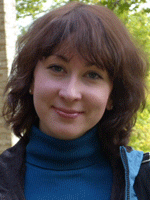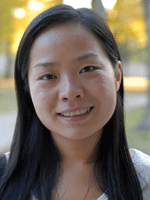Note: This article is over a year old and information contained in it may no longer be accurate. Please use the contact information in the lower-left corner to verify any information in this article.
Foreign language assistants share wealth of knowledge
October 20, 2009
|
|
| Yulia Irgiztseva is on the faculty at Chelyabinsk State Pedagogical University in Russia. |
Although the Fulbright program gives Yulia Irgiztseva the title “cultural ambassador,” she describes her role in students’ lives as something closer to a live encyclopedia.
With a unique fusion of professorial, tutorial, and peer-like functions, Fulbright Foreign Language Teaching Assistants take on an important role on campus. Their assistance to students is not limited to their language or the classroom; they share a wealth of knowledge that extends to current political, social, and even idiomatic elements of their native cultures.
Irgiztseva, from Chelyabinsk, Russia, along with Yang Yang, from Xi’an, China, are spending the next two semesters at St. Olaf as foreign language teaching assistants. These are positions filled each year by two or three native speakers to help students develop their understanding of a different culture and hone their language skills both inside and outside the classroom.
Their positions are funded by the Fulbright Foreign Language Teaching Assistant Program, which gives young educators the opportunity to gain teaching experience, increase their English proficiency, and expand their knowledge of American culture. Assistants enroll in two courses per semester in addition to their teaching assistant duties.
|
|
| Yang Yang is on the faculty at Xi’an Jiaotong University in China. |
In the regular Chinese class she works with, Yang prepares “culturally-oriented” topics to discuss with the class — including anything from Chinese social systems to important festivals. Irgiztseva does the same, and will teach a class on the Russian press next semester for students who spent the past summer in Russia. Both women hold weekly conversation tables over dinner to help students with their conversational skills. Interaction also carries over to residential life: Yang lives in Larson Hall with international students and Irgiztseva lives in the Russian house, providing more opportunities to assist and familiarize themselves with students.
Open education
Another benefit of having these two native speakers on campus is the first-hand experience they bring to students. By comparing St. Olaf to the different types of educational systems they come from, the language assistants provide insight that can lead to a new appreciation for the liberal arts education.
Irgiztseva explained how the dialogue between students and teachers seems to be more open at St. Olaf than at Chelyabinsk State Pedagogical University, where she attended and currently teaches. “Professors inspire students’ critical-minded way of thinking here,” Yang adds. “A liberal education is really important.”
Although the main duty of language assistants is to aid students, Irgiztseva and Yang regard this year as a wonderful opportunity to grow in their own academic pursuits as well. “I applied for the Fulbright program because I wanted to see American culture from the inside,” Irgiztseva says.
Yang hopes to gain a better understanding of the Bible in her religion class and apply that knowledge in “Sources of European Culture,” a course she will continue teaching at Xi’an Jiaotong University when she returns home.
But no matter where their experiences lead them, the interaction between language assistants and students is invaluable — both linguistically and culturally. “If you don’t know the language, how can you know the culture?” points out Yang. “Language and culture are inseparable.”


